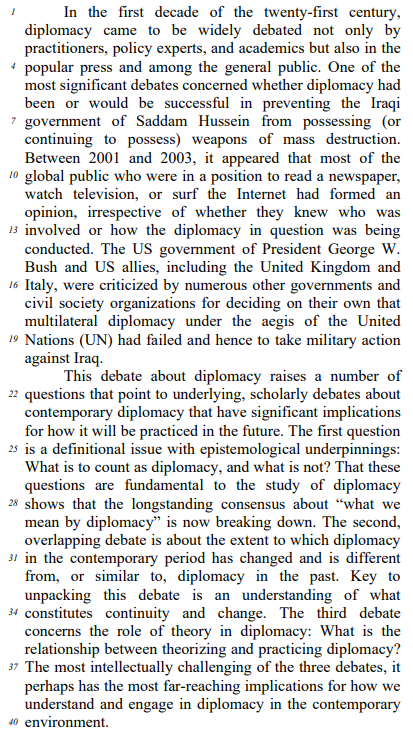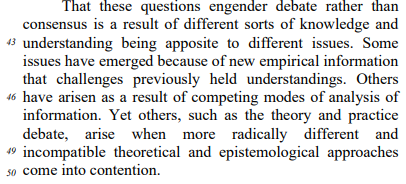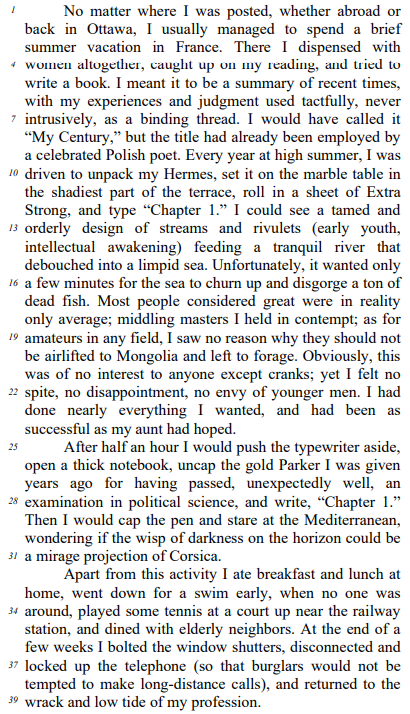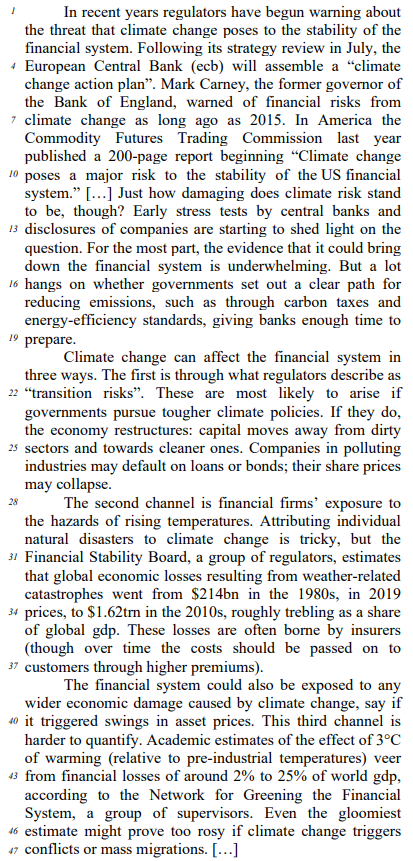Questões de Concurso Público Instituto Rio Branco 2023 para Terceiro-Secretário da Carreira Diplomata - Tarde
Foram encontradas 152 questões


Regarding the vocabulary of the text, mark the statements below as right (C) or wrong (E).
“Irrespective of” (line 12) could be replaced by
regardless of without changing the meaning of the
sentence.


Regarding the vocabulary of the text, mark the statements below as right (C) or wrong (E).
In the fragment “and hence to take military action against
Iraq” (lines 19 and 20), the subject is the United Nations.


Regarding the vocabulary of the text, mark the statements below as right (C) or wrong (E).
The word “far-reaching” (line 38) means “to have great
influence or many effects”.


Regarding the vocabulary of the text, mark the statements below as right (C) or wrong (E).
The word “apposite” (line 43) could be replaced by
opposed without changing the meaning of the sentence.
Text to answer the question.

GALLANT, Mavis. Let it Pass. In: Montreal Stories.
Toronto: McClelland & Stewart, 2004. (adapted)
Based on the text, mark the statements below as right (C) or wrong (E).
The character in the story wanted to write a book but
gave up, since the title he intended to use was already
taken.
Text to answer the question.

GALLANT, Mavis. Let it Pass. In: Montreal Stories.
Toronto: McClelland & Stewart, 2004. (adapted)
Based on the text, mark the statements below as right (C) or wrong (E).
In the fragment “I would have called it ‘My Century’”
(lines 7 and 8), the pronoun it refers to the book the
character is trying to write.
Text to answer the question.

GALLANT, Mavis. Let it Pass. In: Montreal Stories.
Toronto: McClelland & Stewart, 2004. (adapted)
Based on the text, mark the statements below as right (C) or wrong (E).
The word “contempt” (line 18) can be correctly replaced
with disdain.
Text to answer the question.

GALLANT, Mavis. Let it Pass. In: Montreal Stories.
Toronto: McClelland & Stewart, 2004. (adapted)
Based on the text, mark the statements below as right (C) or wrong (E).
The fragment “and returned to the wrack and low tide of
my profession” (lines 38 and 39) states that the character
is elated with his career.
Text to answer the question.

GALLANT, Mavis. Let it Pass. In: Montreal Stories.
Toronto: McClelland & Stewart, 2004. (adapted)
Considering the vocabulary in the text, mark the statements below as right (C) or wrong (E).
The fragment “tamed and orderly design of streams and
rivulets” (lines 12 and 13) refers to an object that was in
the terrace.
Text to answer the question.

GALLANT, Mavis. Let it Pass. In: Montreal Stories.
Toronto: McClelland & Stewart, 2004. (adapted)
Considering the vocabulary in the text, mark the statements below as right (C) or wrong (E).
The word churn up (line 16) means “to move something
with great force or violently”.
Text to answer the question.

GALLANT, Mavis. Let it Pass. In: Montreal Stories.
Toronto: McClelland & Stewart, 2004. (adapted)
Considering the vocabulary in the text, mark the statements below as right (C) or wrong (E).
In “middling masters I held in contempt.” (line 18) the
underlined word is a verb.
Text to answer the question.

GALLANT, Mavis. Let it Pass. In: Montreal Stories.
Toronto: McClelland & Stewart, 2004. (adapted)
Considering the vocabulary in the text, mark the statements below as right (C) or wrong (E).
In the second paragraph, the word “wisp” (line 30) refers
to something small.

According to the text, mark the statements below as right (C) or wrong (E).
The word “assemble” (line 4) can be correctly replaced
by the word “propose”.

According to the text, mark the statements below as right (C) or wrong (E).
Companies may be in debt if a transition risk is taken
into account.

According to the text, mark the statements below as right (C) or wrong (E).
The author presents three arguments to explain how
climate change affects the financial system.

According to the text, mark the statements below as right (C) or wrong (E).
Natural disasters due to rising temperatures, changes and
unbalanced prices of assets can negatively impact the
financial system.
GOES FILHO, Synesio Sampaio. Navegantes, bandeirantes e diplomatas. Brasília: FUNAG, 2015, p. 328, com adaptações.
Considerando o texto precedente como referência inicial, julgue (C ou E) os itens a seguir.
Ao assumir a pasta das Relações Exteriores em dezembro de 1902, a situação estava em seu ponto crítico. No atual estado do Acre, viviam milhares de brasileiros, em sua maioria nordestinos, que, pela segunda vez em um lustro, haviam-se levantado com armas contra a Bolívia, a quem pertencia toda a área, não por velhos e imprecisos tratados coloniais, mas, sim, por um acordo bilateral de limites, relativamente recente, de 1867.
GOES FILHO, Synesio Sampaio. Navegantes, bandeirantes e diplomatas. Brasília: FUNAG, 2015, p. 328, com adaptações.
Considerando o texto precedente como referência inicial, julgue (C ou E) os itens a seguir.
Somente depois da assinatura do tratado de 1867 é que os seringueiros brasileiros, sobretudo cearenses que fugiam das secas do Nordeste, foram entrando nessas regiões dos afluentes da margem sul do Amazonas, do Madeira, do Purus e do Juruá, onde se encontravam as maiores concentrações da Hevea brasiliensis.
GOES FILHO, Synesio Sampaio. Navegantes, bandeirantes e diplomatas. Brasília: FUNAG, 2015, p. 328, com adaptações.
Considerando o texto precedente como referência inicial, julgue (C ou E) os itens a seguir.
Vendo as dificuldades que tinha para administrar um território longínquo e habitado por outros nacionais, a Bolívia havia assumido, em 1901, um grande risco. Assinara um acordo com investidores ingleses e norte-americanos, que dava à empresa criada por estes, o Bolivian Syndicate of New York City, a completa administração do Acre, inclusive com poderes de polícia. Era uma espécie de chartered company, uma daquelas sociedades privadas cujas atuações precederam à colonização direta de algumas regiões africanas e asiáticas pelas potências europeias. O perigo de um neocolonialismo nas Américas era evidente, e esse fato foi usado por Rio Branco para fortalecer a posição brasileira para com os governos e a opinião pública dos demais países do continente.
GOES FILHO, Synesio Sampaio. Navegantes, bandeirantes e diplomatas. Brasília: FUNAG, 2015, p. 328, com adaptações.
Considerando o texto precedente como referência inicial, julgue (C ou E) os itens a seguir.
Em 17 de novembro de 1903, chegou-se ao acordo chamado Tratado de Petrópolis. O Brasil ficaria com metade do território do Acre (cerca de 95 mil km2 ). A Bolívia, por sua parte, incorporaria uma pequena área habitada por bolivianos (de 2.300 km2 ), receberia 2 milhões de libras esterlinas e se beneficiaria de três pequenos ajustes de fronteiras na região do rio Paraguai. Além disso, o Brasil se comprometia a construir a ferrovia Madeira-Mamoré, que criava uma saída boliviana para o Atlântico.